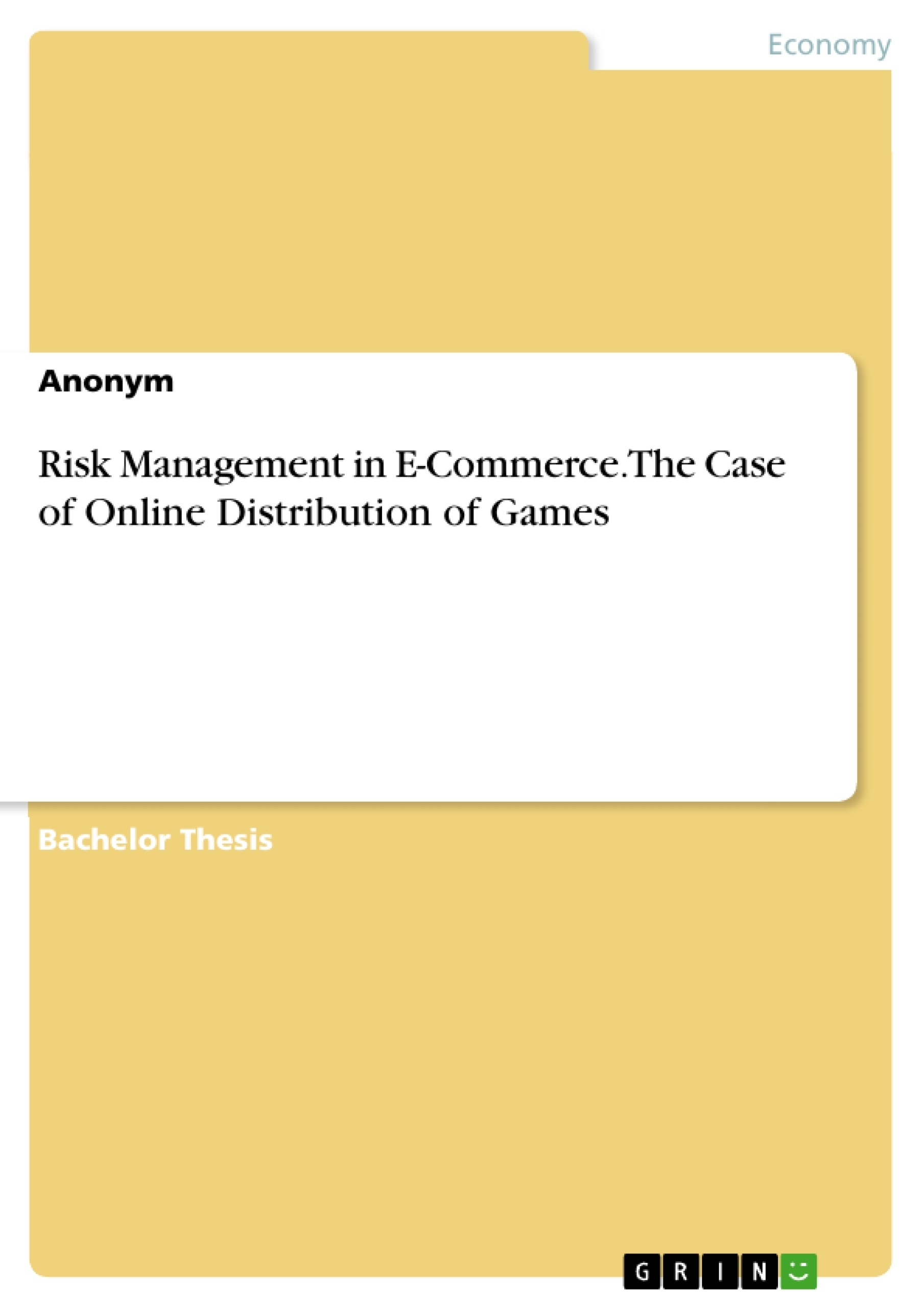The goal of this dissertation is to give the reader a fundamental understanding of the various risks for games publishers’ online business by identifying and examining generally affecting e-commerce risks as well as risks specific to the games industry environment. Furthermore, the author will list possible solutions to reduce negative impacts caused by these risks.
In the last decade, e-commerce transactions like the one described above became a routine. Especially in more sophisticated countries with broadband Internet access, consumers at all age levels utilize ist capabilities to purchase products online. The majority of these transactions are business-to-consumer.
During the last five to ten years, publishers of entertainment software have also targeted the Internet as a new distribution channel. Approaching gamers directly through websites or platform marketplaces is a faster and more profitable way of generating revenue than traditional retailing. Transaction costs are decreased, marketing time is reduced, and direct communication with communities, which is typical for this line of business, is improved.
Certainly there are not only advantages associated with online distribution of video games, and we will later discuss whether cost savings really occur. Several aspects of risk need to be considered before making a decision. It is a question about the strategic orientation of any company operating in the given industry.
Inhaltsverzeichnis (Table of Contents)
- Introduction
- The Significance of Inclusive Education
- Conceptualizing Inclusive Education
- Research Questions and Objectives
- Theoretical Framework
- Social Model of Disability
- Universal Design for Learning
- Intersectionality and Inclusive Education
- Research Methodology
- Qualitative Research Approach
- Data Collection Methods
- Data Analysis Techniques
- Findings
- Teacher Perspectives on Inclusive Education
- Student Experiences in Inclusive Settings
- Challenges and Opportunities in Inclusive Practices
- Discussion
- Implications for Policy and Practice
- Limitations and Future Research Directions
Zielsetzung und Themenschwerpunkte (Objectives and Key Themes)
This work aims to investigate the implementation of inclusive education in a specific context, exploring teacher perspectives, student experiences, and the challenges and opportunities associated with inclusive practices. The study seeks to understand the lived experiences of individuals involved in inclusive education and to contribute to the growing body of knowledge on this important topic.
- Teacher Perspectives on Inclusive Education
- Student Experiences in Inclusive Settings
- Challenges and Opportunities in Inclusive Practices
- The Role of Policy and Practice in Fostering Inclusive Education
- The Impact of Inclusive Education on Student Outcomes
Zusammenfassung der Kapitel (Chapter Summaries)
- Introduction: This chapter provides an overview of the study's rationale, research questions, and objectives. It defines inclusive education and discusses its significance in contemporary educational contexts.
- Theoretical Framework: This chapter examines the theoretical underpinnings of inclusive education, drawing upon key concepts such as the social model of disability, universal design for learning, and intersectionality.
- Research Methodology: This chapter outlines the research approach, data collection methods, and data analysis techniques employed in the study. It discusses the rationale for using qualitative research methods and provides details on participant selection and data gathering procedures.
- Findings: This chapter presents the key findings of the study, focusing on teacher perspectives, student experiences, and the challenges and opportunities associated with inclusive practices.
- Discussion: This chapter discusses the implications of the findings for policy and practice, identifies limitations of the study, and suggests future research directions.
Schlüsselwörter (Keywords)
The primary keywords and focus topics of this work include inclusive education, teacher perspectives, student experiences, challenges, opportunities, policy, practice, social model of disability, universal design for learning, and intersectionality.
Frequently Asked Questions
What are the primary risks in the online distribution of games?
The dissertation identifies general e-commerce risks as well as specific risks unique to the games industry, such as transaction costs, strategic orientation challenges, and the impact of direct communication with gaming communities.
What theoretical frameworks are used to study inclusive education in this work?
The research draws upon the social model of disability, Universal Design for Learning (UDL), and intersectionality as its core theoretical underpinnings.
What are the key objectives of the study on inclusive education?
The study aims to explore teacher perspectives, student experiences, and the specific challenges and opportunities associated with implementing inclusive practices in educational settings.
What methodology was employed in the research?
The author utilized a qualitative research approach, incorporating specific data collection methods and analysis techniques to understand the lived experiences of participants.
How has the internet changed the distribution channel for game publishers?
The internet allows publishers to approach gamers directly through websites and marketplaces, which is faster and more profitable than traditional retailing due to reduced marketing time and decreased transaction costs.
- Citation du texte
- Anonym (Auteur), 2011, Risk Management in E-Commerce. The Case of Online Distribution of Games, Munich, GRIN Verlag, https://www.grin.com/document/312636



